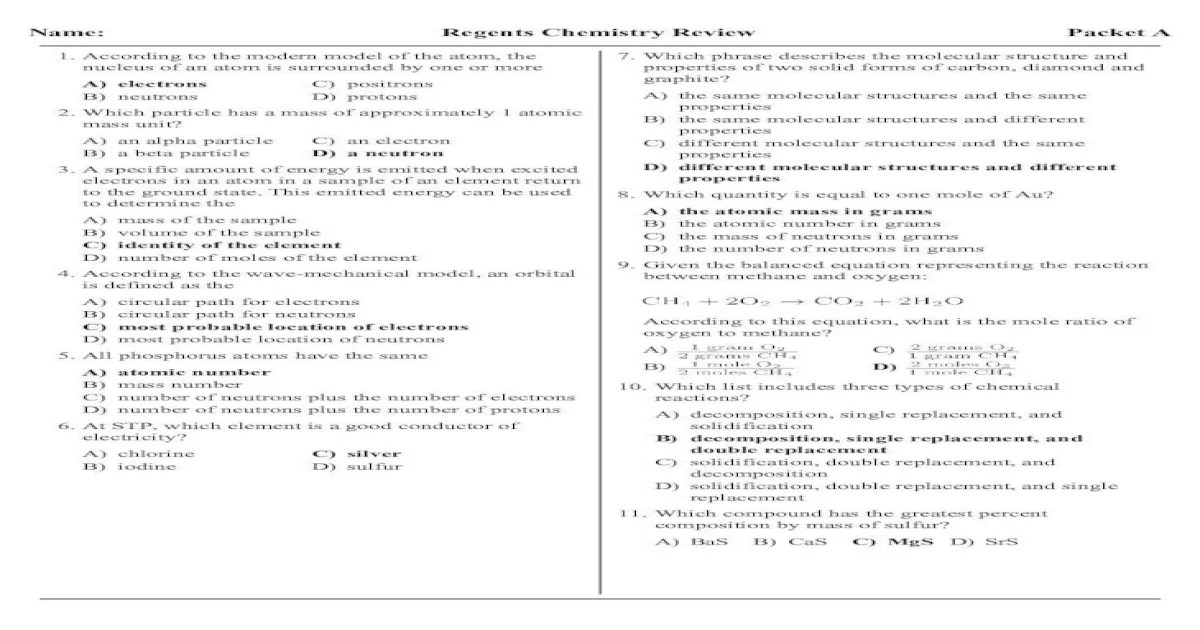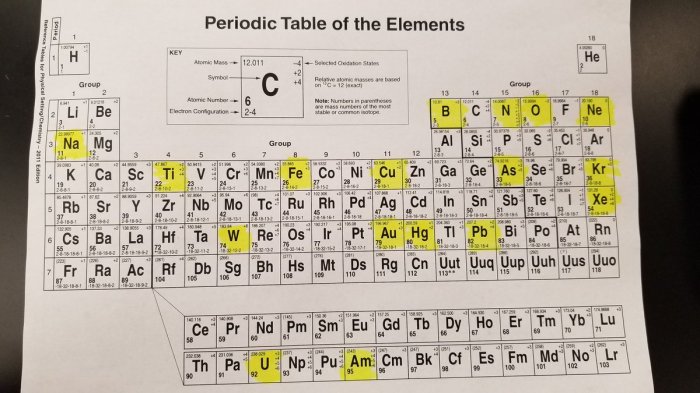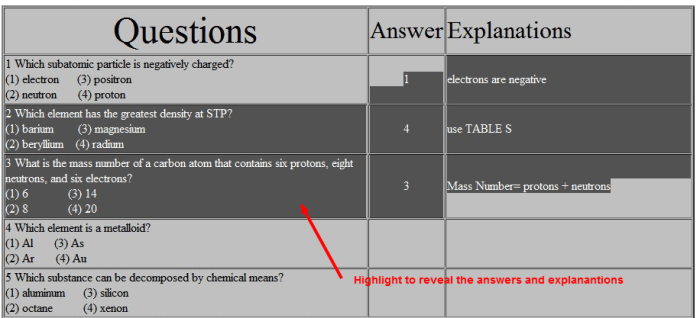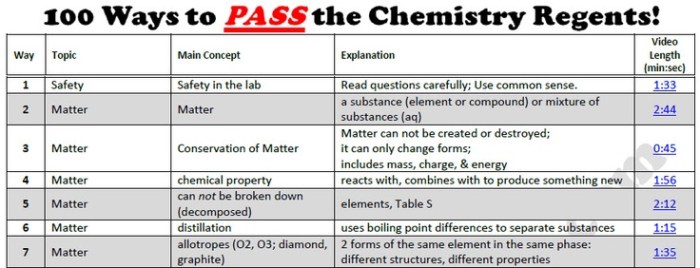Regents chemistry questions by topic – Delve into the world of Regents Chemistry with our comprehensive guide to questions organized by topic. Discover the intricacies of this subject as we explore the various question formats, difficulty levels, and effective preparation strategies. Embrace the opportunity to master Regents Chemistry and achieve academic excellence.
This meticulously crafted resource provides a roadmap to success, empowering you to tackle Regents Chemistry exams with confidence. Prepare to delve into the depths of chemistry concepts, refine your understanding, and emerge as a true master of the subject.
Regents Chemistry Questions by Topic

Regents Chemistry questions are organized into several topics, each covering specific concepts and skills in chemistry. These topics are aligned with the New York State Regents Chemistry curriculum and provide a comprehensive overview of the subject.
By studying these topics, students can develop a strong foundation in chemistry and prepare for the Regents Chemistry exam.
Atomic Structure and the Periodic Table
Questions in this topic cover the structure of atoms, including the nucleus, electrons, and energy levels. Students will also be asked about the periodic table, including the organization of elements and their properties.
- The structure of atoms, including the nucleus, electrons, and energy levels.
- The periodic table, including the organization of elements and their properties.
- The relationship between the structure of atoms and the properties of elements.
- The use of the periodic table to predict the properties of elements.
Chemical Bonding, Regents chemistry questions by topic
Questions in this topic cover the different types of chemical bonds, including ionic, covalent, and metallic bonds. Students will also be asked about the properties of different types of bonds and how they affect the properties of compounds.
- The different types of chemical bonds, including ionic, covalent, and metallic bonds.
- The properties of different types of bonds and how they affect the properties of compounds.
- The use of chemical bonding to explain the properties of compounds.
- The relationship between chemical bonding and the structure of compounds.
Chemical Reactions
Questions in this topic cover the different types of chemical reactions, including synthesis, decomposition, single-replacement, double-replacement, and combustion reactions. Students will also be asked about the factors that affect the rate of chemical reactions.
- The different types of chemical reactions, including synthesis, decomposition, single-replacement, double-replacement, and combustion reactions.
- The factors that affect the rate of chemical reactions.
- The use of chemical reactions to explain the changes that occur in matter.
- The relationship between chemical reactions and energy.
Question Formats and Distribution

Regents Chemistry exams employ various question formats to assess students’ comprehension and critical thinking skills.
The distribution of question types across different topics is designed to ensure comprehensive coverage of the curriculum.
Multiple-Choice Questions
Multiple-choice questions present students with a set of options to choose from. They are typically used to test basic knowledge and understanding of concepts.
Short Answer Questions
Short answer questions require students to provide concise written responses. They assess students’ ability to explain concepts, solve problems, and apply their knowledge to new situations.
Extended Response Questions
Extended response questions are more in-depth and require students to demonstrate their analytical and problem-solving skills. They often involve multi-step processes, data analysis, and the application of multiple concepts.
The proportion of multiple-choice, short answer, and extended response questions varies depending on the specific exam and topic being tested.
Difficulty Levels and Scoring

Regents Chemistry questions vary in difficulty levels, with each topic covering a range of complexities. The scoring system is designed to evaluate student responses accurately, considering both content knowledge and problem-solving skills.
Difficulty Levels
Regents Chemistry questions are categorized into three difficulty levels:
- Easy:These questions typically require basic recall of concepts and straightforward calculations.
- Medium:Medium-difficulty questions involve more complex problem-solving and the application of multiple concepts.
- Hard:Hard questions demand a deep understanding of chemistry principles and the ability to synthesize information from different sources.
Scoring System
The scoring system for Regents Chemistry questions is based on a point system. Each question is assigned a certain number of points, depending on its difficulty level and the complexity of the response required.
Points are awarded for:
- Correctly answering the question
- Showing work and providing explanations
- Using appropriate units and significant figures
Range of Scores
The range of scores typically achieved on different question types varies depending on the difficulty level. For easy questions, students can expect to score between 70% and 90%. For medium-difficulty questions, the range is typically between 50% and 70%, while for hard questions, it is between 30% and 50%.
Exam Preparation Strategies

Preparing for Regents Chemistry exams requires a comprehensive approach that addresses the specific topics covered in the curriculum. By understanding the format and difficulty levels of the exam, students can develop effective study strategies tailored to each topic.
Time Management
Effective time management is crucial for success on the Regents Chemistry exam. Students should allocate sufficient time to each topic, ensuring they cover all essential concepts and practice questions. Breaking down the exam into smaller sections and setting realistic goals can help manage time efficiently.
Practice Techniques
Regular practice is essential for mastering chemistry concepts. Students should solve a variety of practice questions, including multiple-choice, open-ended, and laboratory-based questions. This allows them to identify areas of weakness and focus their studies accordingly. Practice questions can be found in textbooks, online resources, and past exam papers.
Resources
Numerous resources are available to support students in their preparation for the Regents Chemistry exam. These include textbooks, online tutorials, practice tests, and study guides. Students should utilize these resources to supplement their classroom learning and reinforce their understanding of the material.
Study Methods
Effective study methods include active recall, spaced repetition, and concept mapping. Active recall involves actively retrieving information from memory, such as by answering questions or explaining concepts. Spaced repetition involves reviewing material at increasing intervals to strengthen memory. Concept mapping helps students visualize and connect different concepts within a topic.
Common Mistakes and Areas of Improvement
Students often make common mistakes on Regents Chemistry questions, indicating areas where their understanding of chemistry concepts needs improvement. Addressing these weaknesses is crucial for enhancing comprehension and achieving success on the exam.
Mistakes in Calculations
- Incorrect unit conversions: Students may fail to convert units correctly, leading to incorrect answers.
- Misinterpretation of significant figures: Students may not apply significant figure rules correctly, resulting in inaccurate calculations.
- Rounding errors: Students may round numbers prematurely or incorrectly, affecting the accuracy of their calculations.
Lack of Conceptual Understanding
- Misconceptions about chemical bonding: Students may have misconceptions about the types and properties of chemical bonds.
- Incomplete understanding of chemical reactions: Students may struggle to balance equations or predict the products of reactions.
- Difficulty applying stoichiometry: Students may have difficulty using stoichiometry to calculate quantities in chemical reactions.
Addressing Weaknesses
To address these weaknesses, students should:
- Practice unit conversions and significant figure rules regularly.
- Review the concepts of chemical bonding, chemical reactions, and stoichiometry.
- Seek help from teachers, tutors, or online resources to clarify misconceptions.
- Utilize practice problems and review materials to reinforce their understanding.
FAQ Overview: Regents Chemistry Questions By Topic
What is the best way to prepare for Regents Chemistry exams?
The key to success lies in consistent practice, thorough understanding of concepts, and effective time management during the exam. Utilize practice questions, review class notes, and seek clarification from teachers or tutors whenever needed.
How can I improve my understanding of chemistry concepts?
Engage in active learning by participating in class discussions, conducting experiments, and solving practice problems. Utilize visual aids, such as diagrams and charts, to enhance your comprehension. Seek additional resources, such as textbooks, online materials, and videos, to reinforce your understanding.
What are some common mistakes to avoid on Regents Chemistry exams?
Avoid careless errors by carefully reading instructions and ensuring that your answers are clear and concise. Practice time management to prevent rushing and ensure that you attempt all questions. Be mindful of units and significant figures, as errors in these areas can lead to incorrect answers.